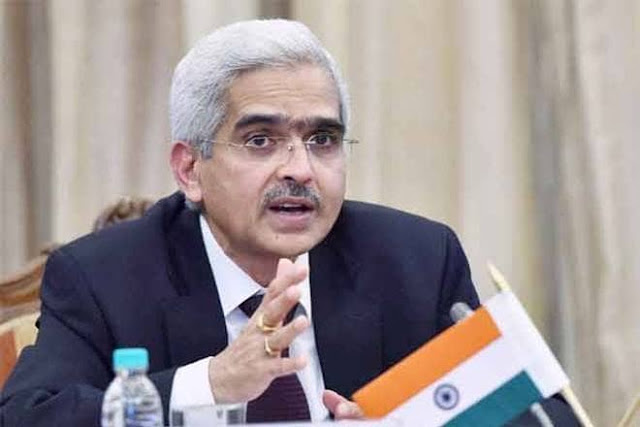Government appoints Shaktikanta Das as new RBI Governor
The announcement comes after Urjit Patel announced his resignation from the post on December 10.

Shaktikanta Das, member of the 15th Finance Commission and former Economic Affairs Secretary, will take over as the new Reserve Bank of India (RBI) Governor, the government said on December 11.
Das’s appointment comes a day after Urjit Patel unexpectedly resigned as the central bank chief, amid festering disagreements between the RBI and the Finance Ministry on several issues.
The Appointments Committee of the Cabinet (ACC) has approved the appointment of Shri Shaktikanta Das, former secretary, department of economic affairs, as the Governor, Reserve Bank of India (RBI), for a period of three years," a government statement said.
FM Arun Jaitley also welcomed Das’s appointment as the RBI top boss.
"Besides his experience as the Revenue Secretary and Economic Affairs Secretary, he also had the experience in preparing several Budgets as Joint Secretary in charge of Budget division. Subsequently, he has been a G20 Sherpa on behalf of India. He's been a member of 15th Finance Commission. I think he has the right credentials and has been extremely professional. He has worked under various governments has excelled himself & I am sure he will excel in meeting the challenges before India's economy as a Governor of RBI," he said.
It was not immediately known whether Das was shortlisted and selected through a process of search committee, a practice that was adopted during Patel's appointment. Das takes over three days before the RBI's scheduled board meeting on December 14, slated to discuss several contentious issues.
DEA Secretary Subhash Chandra Garg said that the RBI board meeting as of now will be held as per schedule on December 14.
"It is for RBI to decide about board meeting. If RBI decides otherwise, we will get to know," he said.
Unlike Patel or his predecessor Raghuram Rajan, Das will move straight into the top job at Mumbai's Mint Street without an overlap at the RBI headquarters.
While Patel was an RBI deputy governor for nearly three years before taking charge as the central bank chief, Rajan had come had come on board as the then governor D Subbarao's officer on special duty (OSD) to manage the transition, in August 2013, a month before he officially took over as the Governor.
Also, unlike Patel and many of his predecessors, Das, a retired Tamil Nadu cadre IAS officer, is not a trained career economist. A former Economic Affairs secretary, he is currently India’s Sherpa to G20, tasked with steering the negotiations at one of the most strategically important groups of countries. Subbarao, a former finance secretary, was the last IAS officer to serve as the RBI Governor.
Das, who studied history at Delhi University's St Stephen's College, was to remain India's G20 Sherpa was until December 31, 2018. Das (62) is also a member of the 15th finance commission, a Constitutional body mandated to recommend measures and methods on how revenues, which the government earns through various taxes, need to be distributed between the Centre and states.
He will have to quit his existing official positions—as India's G-20 Sherpa and a finance commission member—after taking over as the 25th RBI governor.
Das, who retired as the Economic Affairs Secretary in the finance ministry in February 2017, had become the face of demonetisation, the surprise move to outlaw Rs 500 and Rs 1000 notes from the midnight of November 8, 2016.
He, along with Patel as the RBI Governor, were tasked with the responsibility of carrying out the world's largest currency culling exercise.
It was pitched as government's broad strategy to clamp down on India's bustling parallel economy by launching an attack on the hidden wealth held in undisclosed cash. The move triggered howls of protest as serpentine queues outside ATMs became of lasting image of the shock currency recall plan.
Das will be familiar with the RBI’s functioning, and will have to dig deep into his pocket of experience as a former member of the central bank, which he served in his capacity as the economic affairs secretary.
He takes over at a time when the relationship between RBI and the finance ministry has been marred by disagreements on several contentious issues, including reported plans by the government to get the central bank transfer its surplus reserves to help plug the budget deficit.
Patel’s deputy Viral Acharya had first obliquely flagged the dangers of the government treading onto the central bank’s territory, eroding its autonomy.
The RBI Act, the key legislation that defines the central banks functioning, role and reporting relationship with government, has become part of mainstream public discourse, with a strong body of opinion on both sides of the fence.
The finance ministry was reportedly looking to invoke "Section 7" of the RBI Act that allows the government to ask the RBI take certain decisions after consulting the central bank.
The finance ministry is also in favour of the RBI giving more funds to non-banking finance companies (NBFCs) to keep the credit flow flowing for India’s small enterprises.
The RBI has made it clear it doesn’t believe that NBFCs need more funds now. After a marathon board meeting that lasted more than nine hours on November 19, RBI made concessions on capital adequacy of banks, while two contentious issues of transfer of surplus reserves and relaxing norms for weak banks were referred to committees.
The board has advised RBI to let banks recast loans up to Rs 25 crore given to micro, small and medium enterprises (MSMEs).
Source: https://www .moneycontrol.com/news/business/economy/government-appoints-shaktikanta-das-as-new-rbi-governor-3279441.html
If you want more information regarding the Market News & many other tips like Intraday Tips, MCX Normal Calls, Bullion Market Tips, Share Market Services, NSE & BSE Market Tips, Free MCX Market Tips, MCX Premium Tips, Bullion Energy Tips, commodity market tips.
Visit: TradeIndia Research
Whatsapp User Join Our Group: 9300421111






We have vast experience in stock market scientific trading since 1991. intraday tips
ReplyDelete